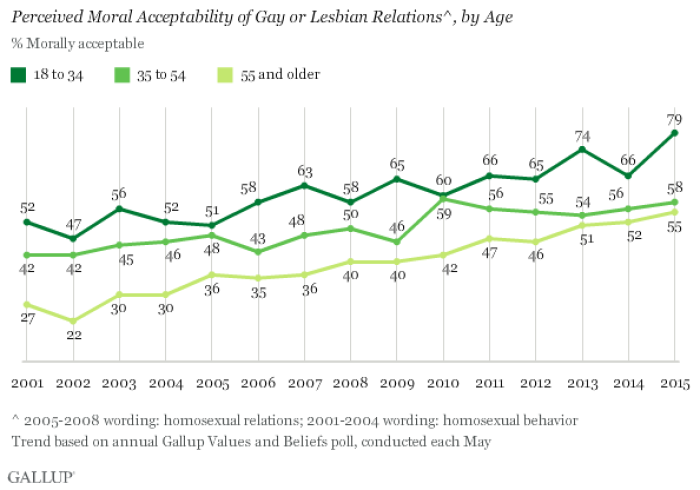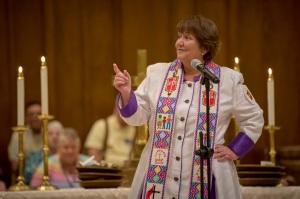5 Things We've Learned About Americans and Moral Values

Norms surrounding behaviors relating to sexual behavior and reproduction have been shifting in the U.S. in recent years. Where once normatively taboo, certain behaviors and lifestyle choices are now much more likely to be normatively sanctioned. Associated with these normative shifts has been the increased tendency for Americans to label themselves as socially liberal, dethroning the heretofore majority status enjoyed by the label "social conservative."
Norms are shared expectations of behavior for specific situations. The behaviors associated with norms are often violated in practice, but the existence of the norm means that these violations tend to be manifested privately and not publicly. Historically, examples of normatively proscribed behaviors in the U.S. have included gay and lesbian relations, sex outside of marriage, having a baby out of wedlock and polygamy. As noted, American norms surrounding these behaviors have been shifting.
We at Gallup have reported on these shifts in a series of stories, and various news outlets and commentators have given their opinions on what these shifts may mean as the results have become known. Herewith are five things that seem particularly interesting to review about these shifting attitudes.
1. The shift toward more liberal attitudes on a number of social and values issues has occurred across the age spectrum, not just among young people. The changes are not the result solely of the ripple effect wherein young millennials adopt new positions on moral issues and as they age take their new values with them through the age cycle, gradually replacing older people who die off. Instead, we have seen the 65 years and older group move as much to the left as the shift among the 18- to 29-year-olds over the past decade and a half. Differences continue to persist between age groups, but what we have seen is a rising tide that has lifted all ships on this sea of moral behavior.
Here is the age trend on the moral acceptability of gay and lesbian relations:

Note that the shift over the past 14 years in moral acceptability of gay and lesbian relations among Americans aged 55 and older is 28 percentage points (27% to 55%). The shift among 18- to 34-year-olds has been 27 points, almost exactly the same. This could be age creep to some degree, as each year a segment of those in the younger age group moves into an older age group. But if this was totally age creep, we would have seen the 55+ group holding steady as the young group aged first into the 35- to 54-year-olds group. But we didn't see that. Older Americans have been changing their attitudes just as fast as younger Americans.
The 18- to 34-year-old group in 2015 is largely composed of individuals who were younger than 18 when we first interviewed on this topic in 2001. It is clear those who were younger than 18 in 2001 have manifested liberal positions on this issue as they moved into the 18 and older age range over the past 14 years. They show no signs of being less liberal than their brothers and sisters who came before them.
But overall, the best explanation seems to be that the forces pushing a higher acceptability of gay and lesbian relations (and other issues) are operating on the entire American culture across the age spectrum, not just on young people.
2. Americans have not shifted their views of all moral issues over time. The notable exception is the American public's views of married men and women having an affair, which have not changed much. That particular behavior remains essentially culturally taboo (in the sense that it is viewed as morally unacceptable to 90%+ of the public), even as other behaviors relating to sexual behavior and procreation have shifted. This is a fairly remarkable phenomenon. One of the explanations for why the public's acceptance of other issues has been rising is the fact that there is de facto evidence that the behaviors are occurring in the real world, and the public may come to the point where they feel it is appropriate to go ahead and accept the inevitable. But there is certainly evidence that extramarital affairs happen -- among presidents, governors and senators, not to mention people from many non-political walks of life. Although I don't have empirical evidence supporting this, it's a reasonable assumption that many Americans know someone who has been involved in an extra-marital affair. The prevalence of these behaviors has not, however, changed the norms surrounding them. Having an affair is still not sanctioned in a moral sense by the public.
3. The largest shifts in cultural attitudes have been those relating to gay and lesbian issues. I'm sure there will be books written (some have already been published) and academic studies conducted examining how and why this truly remarkable shift in cultural norms has taken place in a period of just a few years. This shift will be particularly remarkable if the Supreme Court rules later this month that it is not legal for states to ban same-sex marriage.
I don't think anyone has a total understanding of why these changes occurred, and as a sociologist I can say it's difficult to think that we will ever know exactly what has gone on. We know that high profile individuals have publicly disclosed that they are gay or lesbian, and that could have made a difference. The entertainment industry has made particular efforts to show gay and lesbian characters as more mainstream in their productions. There have been changes in actual legislation relating to gay and lesbian behavior, including a cascade of states that have declared gay marriage legal within their boundaries. Leaders have publicly stated their support for gay and lesbian causes. Gay and lesbian leaders have very shrewdly positioned gay and lesbian rights as a civil rights issue, making it more difficult for others to oppose the changes. Fewer Americans now than in the past have formal religious identities, and this loosening impact of religion could be a factor.
4. Despite these shifts in attitudes, 72% of Americans say the state of moral values is getting worse in this country rather than better. And almost as many rate the state of moral values in this country as poor or only fair.
As my colleague Justin McCarthy pointed out in his review, these attitudes have remained very stable, despite the leftward shift in Americans' (and Republicans') positions on specific moral issues and how they label themselves. Gallup has been noting in a series of articles that Americans are shifting left on moral issues. But they aren't shifting on their views of the state of moral values in the country. Why the change in one area and not the other?
In part, this can be explained by understanding that when Americans are asked about moral values ("How would you rate the overall state of moral values in this country today -- as excellent, good, only fair or poor?" and "Right now, do you think the state of moral values in the country as a whole is getting better or getting worse?") they are thinking about things other than just the norms surrounding sexual behavior and reproduction issues. When we asked Americans a few years ago to talk about what was wrong with moral values, many responded by talking about the lack of consideration of others, deficits in the public's compassion, personal accountability, respect and tolerance; greed, selfishness, dishonesty -- in addition to things such as the change in family structure, lack of religion, lack of morals (a somewhat tautological response) and fairly small percentages who mention sexual promiscuity, abortion and gay marriage, specifically. Thus, we have Americans largely saying that the overall moral tone of our culture is in bad shape and getting worse, even as they increasingly say that formerly taboo behaviors are morally acceptable.
5. All cultural shifts have consequences. One such consequence is politics. The New York Times columnist Charles Blow recently reviewed Gallup data discussing the political implications of these normative changes in a recent opinion piece, noting:
This change [more liberal positions on social issues] poses a particular challenge for the Republican Party and its national aspirations, not so much at the congressional seats, many of which are safe, but for presidential candidates.
Part of the issue, as the likely candidate Jeb Bush put it last year, is that for a Republican to become president, he or she would have to be willing to "lose the primary to win the general" election.
It was a catchy phrase and everyone understood what he was saying: Don't allow the Republican debates and primaries to drag you so far right that you will never be able to recover in the general election. But the problem is that there is no way to compete in the general without first winning the primaries securing the nomination.
This general process is certainly not new. Candidates on both sides of the aisle have always -- at least in recent decades -- been forced to thread the needle of appealing to their more strongly ideological party base in the primary season, while retaining cross-appeal for the general election. The issue for conservatives now, as Blow and others have pointed out, is that the base of those who are socially conservative has shrunk among both the party loyalists and the general population. As an example, a candidate like Mike Huckabee, whose differentiator has been his religious background and strong positions on moral issues, may face more of a challenge now than in the past if he attempts to primarily run on a platform of social/values issues.
But, this isn't to say that a candidate may not be able to position him or herself as having concerns about moral values in the nation more generally. As we have seen, stating that moral values are in decline would resonate with the attitudes held by a huge percentage of Americans. Candidates could, in theory, associate these concerns with evidence showing the value of marriage as an institution -- given its positive relationship to personal well-being and to children's outcomes (although the reasons for these relationships are complex). But, generally speaking, there is little doubt that it's likely to be a more difficult environment in this election for conservative candidates to focus on specific moral issues than has been the case in previous cycles.




























